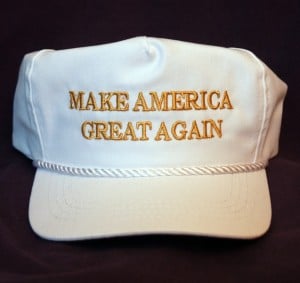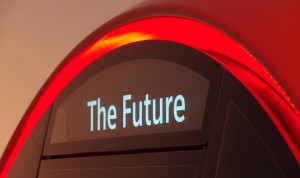 To begin with, you have to know that I’m not a Donald Trump supporter. I’m not even a Trump sympathizer. I’m unimpressed with his character and his background, and I think he’s poorly suited for the Presidency. I’m troubled by his ugly rhetoric, and by its popularity. I think he’s doing real harm to our political culture. I hope he is not the Republican nominee, and if he is I will vote against him in the general election.
To begin with, you have to know that I’m not a Donald Trump supporter. I’m not even a Trump sympathizer. I’m unimpressed with his character and his background, and I think he’s poorly suited for the Presidency. I’m troubled by his ugly rhetoric, and by its popularity. I think he’s doing real harm to our political culture. I hope he is not the Republican nominee, and if he is I will vote against him in the general election.
And apparently in my social circle I’m not alone in these sentiments.
F0r months now, my kids have come home from school, church, and playdates with horror stories about Trump, what a clown or villain he is, how a Trump presidency would be the end of the world as we know it. One of my children asked me in all seriousness where we would move if Trump is elected. Another woke with nightmares about evil Trump.
They aren’t getting this doomsday rhetoric from me, although I’ve told them that I will certainly vote against Trump, and why. They’re getting their vehement anti-Trumpism from our community. With a directness I don’t recall in any other election cycle, my kids’ school teachers, church teachers, coaches, peers and peers’ parents have urged their political views about Trump on my children.
This worries me, but not for the reason you might think.
Remember, I’m no fan of Trump, and I don’t disagree with the messages my kids are getting. I don’t strongly object to teachers expressing their political views to my kids, though I would appreciate a bit more nuance and humility.
What worries me is precisely that my kids’ social environment is so uniform in its opposition to Trump.
Because here’s the thing: Trump is incredibly popular among many groups, for reasons that may be foreign to me but are nevertheless deeply felt. The populist forces propelling Trump to victory are forces that will shape, for better or for worse, the future of our nation.
The fact that my family’s social circle takes in few Trump supporters shows how segregated our society is by education, wealth, and outlook.
It’s a division that is amplified online: among my 800 Facebook friends, only four have “liked” Donald Trump. But the implications of this divide are much deeper and more troubling than the polarization of social media.
Scholars from the right and the left, people like Charles Murray and Robert Putnam, have observed this growing chasm in American culture and warned of its effects. Powerful elites live in enclaves of their own kind, ignorant of the stresses of working class life, which is buffeted by eroding social ties and sagging employment prospects.
We see this divide in the Trump phenomenon. While Trump has made inroads into nearly all categories of primary voters, one category remains immune. In what’s sometimes called the “diploma divide,” college-educated voters remain resistant to Trump’s campaign, instead dividing their vote among the establishment candidates.
So what my kids’ absorbed aversion to Trump tells me is that I am raising them in precisely the kind of elite enclave that hastens the coming apart of our nation. I regret that, and I try to mitigate its effects whenever I can. But as an anxious parent, I’m unwilling to gamble with my kids’ education. And thus, like so many other elite American parents and against my own larger aspirations, I’m raising my kids in a social circle that is largely homogenous in relative wealth, education and outlook. That’s why it includes so few Trump supporters.
On the one hand, thank goodness for that. On the other, I fear that the division will only lead to more of the same. And when Trump’s involved, that’s never a good thing.










